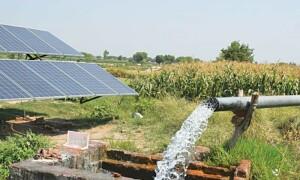
Pakistan: Farmers Hold Hunger Strike In Quetta, Demand Implementation Of Demands
While addressing a press conference, KIP chairman Khalid Hussain Bathh said that the strike would continue until the government accepts and implements their demands regarding growers and landowners impacted since 2022, Pakistan's leading daily Dawn reported. He expressed regret over government not taking measures to resolve their issues despite repeated requests.
Bathh said, "We are once again presenting our 15-point charter of demands." He announced that a hunger strike camp had been created outside the press club and warned that the token hunger strike will be converted into a general hunger strike if the authorities did not resolve their issues.
KIP Chairman slammed the Balochistan government for not providing solar energy systems to growers and landowners despite promises and mentioned that Quetta Electric Supply Company had been disconnecting their power connections. He urged the government to give funds to growers and landowners for the solarization of agricultural tubewells and demanded the restoration of Rabi canal tubewell connections in Manjoshori, Nasirabad, and the restoration of power supply in Harnai and Kuchlak.
Earlier on August 16, KIP chairman Khalid Hussain Bathh slammed the Balochistan government for not providing funds to the farmers of Nasirabad Division - the only green belt of the province - for converting agricultural tube wells to solar energy despite making promises.
While addressing a press conference on August 16, he stated that tube wells have become non-operational, crops are drying up, and farmers are facing huge financial losses due to the disruption of electricity supply, Dawn reported. He stated that authorities had promised funds for solarisation to farmers. However, the approved funds have not been released so far.
Electricity connections were disconnected, and the supply was shifted from three-phase to two-phase before the payments were made. He stated that tube wells had become non-operational, and no water was flowing in the Rabi Canal, while agriculture, livestock, and local communities were suffering badly due to the disruption of the electricity supply.
The KIP Chairman said that crops were destroyed due to the unavailability of irrigation water, and there was even a shortage of drinking water. After the Balochistan Irrigation Minister's assurances, the farmers had sown crops; however, the seeds were destroyed due to water shortage.

Legal Disclaimer:
MENAFN provides the
information “as is” without warranty of any kind. We do not accept
any responsibility or liability for the accuracy, content, images,
videos, licenses, completeness, legality, or reliability of the information
contained in this article. If you have any complaints or copyright
issues related to this article, kindly contact the provider above.


















Comments
No comment